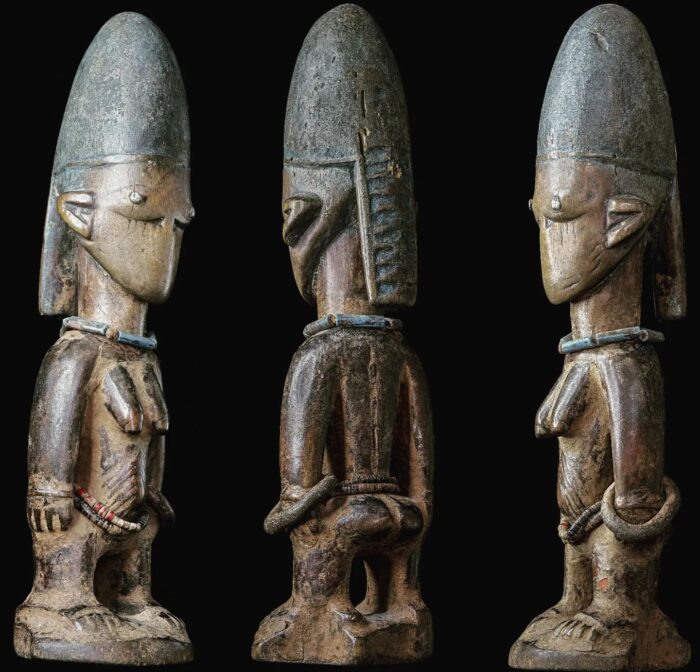Owe Yoruba: 500 Yoruba Proverbs & Their Meanings – What’s more, the Yorubas appear to have a smart remark for every scenario and a solution to every query.
When you comprehend the precise translation of Yoruba proverbs and the meaning gained from them, you will realize how rich the Yoruba culture is. It may make you giggle while also providing insight into the depth of the culture. This page contains Yoruba proverbs and their meanings.

List Of Owe Yoruba: 500 Yoruba Proverbs & Their Meanings:
Proverb: Foriti Foriti lomu ki ori Agba pa
Translation: An old man’s head is bald because he has taken on so much trouble on his head throughout his lifetime.
Meaning: Elderly maturity is the result of lengthy perseverance.
Proverb: Ile oba t’o jo, ewa lo busi
Translation: When a king’s palace is destroyed by fire, the rebuilt palace is even more lovely.
Meaning: Necessity is the mother of invention; great deeds are accomplished after conquering several challenges.
Proverb: Gbogbo alangba lo d’anu dele, a ko mo eyi t’inu nrun
Translation: Because all lizards sleep flat on their stomachs, it is difficult to tell which one has a stomach ailment.
Meaning: Everyone appears the same on the surface, yet everyone is coping with various issues that you are unaware of.
Proverb: Ile la ti n ko eso re ode
Translation: Charity begins at home
Meaning: Because excellent manners, ethics, character, and behavior are learned at home, you can trace a man’s (good or poor) behavior back to his/her upbringing.
Proverb: A pę ko to jęun, ki ję ibaję
The individual who eats late will not eat spoiled or rotting food.
Meaning: The patient Dog consumes the heaviest bone. In every scenario, it is better to be patient and devise a well-thought-out plan than to make hasty judgments and accept ill-conceived answers.
Proverb: Bí a bá ro dídùn ifọ̀n á ó ọ’ra déegun
Translation: If a person recalls the pleasure he or she felt when scratching an itch on the body, he or she is inclined to continue scratching the skin until it reaches the bone.
Meaning: Everything in life has limitations and bounds, and it is critical to remember this in order to prevent disasters.
Proverb: Akìí rí ẹfọ̀n ta lẹ́ẹ̀ mejì
Translation: It is not a good idea to shoot a Buffalo twice. A buffalo is a constantly attentive and security aware animal. It is also mostly located in dense woodland, where it is difficult or nearly impossible for any person to simply channel his portion. If a hunter is fortunate enough to sight a Buffalo, he should be cautious and only shoot once, for if he misses, the Buffalo will most likely flee for good.
Meaning: This proverb is frequently used to advise someone who is about to make a decision to be cautious and make the proper one. Opportunities are only available once.
Proverb: Ọmọdé kìí mọ Ori jẹ kí ó mà ràa lọ́wọ́
A child does not know how to consume pap without getting pap on his hand.
Meaning: We recognize a youngster by how he or she eats, staining his or her hands and wasting food. When apologizing on behalf of a younger person who has insulted or been disrespectful to an adult, this proverb emphasizes that the youngster was merely being infantile and should be forgiven.
Proverb: “Ìkòkò ò ni gba omi k’ó tún gba ẹyìn
That is, the pot cannot hold both the palm fruit and the water at the same time.
Two masters cannot share a boat; two incompatible persons cannot live or work together.
Proverb: Òkú ò mọ iye aa ra agọ̀
Translation: The dead are unaware of the cost of their coffin.
Meaning: This proverb is used to describe someone who wastes wonderful goods because he is not the one who paid for them.
Proverb : “Bi Esin ba dáni gúlè ã tun gun ni!”
Meaning: If a horse falls on someone, we re-climb it.
When a plan fails, you should not give up but rather keep trying.
Proverb : Aje ke lana omo ku loni, tani o so wipe ko mope ana lo pa omo je
Translation: Yesterday there was a witch yell, and today a kid died. Who could deny that the witch is to blame for the child’s death?
Meaning: If a threat was made yesterday and a catastrophe occurred today, who would be surprised to learn that the person who threatened to strike yesterday is responsible for the disaster?
Proverb: Bí kò fę ju ìpàkó, ęşin tí ó ngùn á ję kojū
Translation: No one rides a horse without moving his head, either consciously or involuntarily.
Meaning: Your social standing determines your attitude toward others.
Proverb: Bí abá so òkò sójà ará ilé eni ní bá
Translation: Whoever tosses a stone in the market will hit someone he knows.
Meaning: Just as the market is often busy, so is life, and people’s paths cross frequently, therefore be mindful of your actions since they may come back to haunt you.
Proverb: Agba ki wa loja, ki ori omo tutun o wo
Meaning: When an older person is there, he or she is able to rectify mistakes since he or she is more experienced and wiser.
Proverb: Adìẹ funfun kò mọ ara rẹ̀lágbà
Translation: The white chicken is unaware of its age.
Meaning: An older person is expected to respect oneself.
Proverb: Ọbẹ̀ kìí gbé inú àgbà mì
Translation: In an elder’s stomach, the soup does not travel about.
Meaning: It is necessary to be able to maintain secrets.
Proverb: À ń pe gbẹ́nàgbẹ́nà ẹyẹ àkókó ń yọjú
Translation: A sculptor is summoned, but it is the woodpecker who appears.
Meaning: You should never overestimate yourself or engage in talks to which you are not called.
Proverb: Eni bama m’obo akoko se bi lagido
Translation: To catch a monkey, you must behave like one.
Meaning: In some cases, you must play the role in order to acquire what you desire.
Proverb: Díẹ̀ díẹ̀ nimú ẹlẹ́dẹ̀ẹ́ fi ń wọgbà
Translation: The pig’s nose gradually makes its way into the yard.
Meaning: Catch the small foxes before they ruin the vineyard. Attend to a little issue before it grows larger and more difficult to manage.
Proverb: Iy’o wu mi e wue, oun e, ni mu omo iya meji jeun ototo
Translation: Two brothers eat separately due to variations in tastes and dislikes.
Meaning: One man’s food is another man’s poison, and each person has characteristics that are unique to them.
10 Popular Yoruba Proverbs And Their Meanings :

1) Ebi npa ejo, ahun nyan, ati ahun ati ejo, eran jije ni fun olode; Both the tortoise that taunts a hungry snake are edible meat (preys) to a hungry hunter.
2) Orisa je kin pe meji Obirin ko denu.(“God bless my hosehold with a sencond woman” is a woman’s false wish)
3) Eniti eegun nlepa ko roju , bi o ti n re eniyan beni o n re araorun ( Do not falter if you are being chased as one is getting tired so is the one chasing you)
4) Ero ona ni royin oka to gbo (Passers-by are the first to bring the news that the corn is ripe)
5) Eyin to ta yo,wahala enu ni. (A protruded tooth is a problem to the mouth)
6) Ikun nje ogede ikun re di, ikun o ma pe ohun todun ni npa ni (The rodent is exuberant as it feeds on banana, it should have known though that eating sweet stuffs can be deadly)
7) Ebi o ki wo nu koro mi wobe (A hungry person is not a good listener). Perhaps a blatant interpretation is “A hungry person is an agry person”
8) Eti baba nile, eti baba l’oko;eniyan ni i je be (Father hears everything because people tell him)
9) Asa nba eyele sere eye nyo, eyele n fi iku sere (The hawk is having a deceitful play with the pigeon, the pigeon is rejoicing, it does not know it is toying with death)
10) Omo eni kii se idi bebere, ki a fi ileke sidi omo elomi (One’s daughter would not possess a gorgeous waist while one adorns another person’s daughter with a waist bead)

Be the first to comment